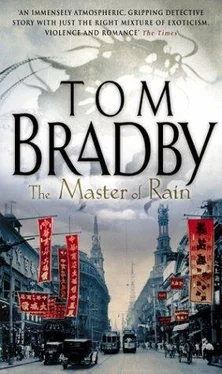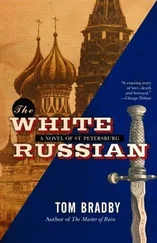She worked down his body to his feet, washing them as carefully as the rest of him, before pulling him forward into the stream of water.
Field took the soap from her. He began at her neck. She watched him as he washed under her armpits and across her breasts, teasing her nipples with a soapy hand.
“Washing.”
Her stomach was flat, her belly button tiny and shallow.
He knelt down, working the soap into a lather again, washing around her hips and then into the mound of hair at the parting of her thighs.
He worked downward, placing his hand gently between her legs, feeling the response in her body.
He washed her feet but without conviction. She stepped forward, her body quivering and pressed hard against his, the water streaming over them. Natasha lifted herself against him, into his arms, her legs around him as she leaned back against the glass screen.
They dried each other afterward, and then she brought over his clothes and put them carefully on the bed. She placed the flat of her hand against his stomach, then began to dress him, her touch reassuring. His suit was crumpled and still damp from the rain.
“A new suit?”
“Yes.”
“You should take better care of it.”
Natasha placed her own clothes on the bed. She pulled the garter belt around her waist and then sat down. Field took the stockings and placed them over her toes, rolling them slowly up her legs and fastening them at the top as she watched him.
“You haven’t done this before, have you, Richard?”
Field found it impossible to answer. It seemed to open up too many other questions. She stood and took his head to her stomach. When he straightened and put his big arms around her, he noticed, for the first time, a picture of the tsar and tsarina on the mantelpiece above the fireplace on the far wall. It was a formal picture, Nicholas in military uniform, his wife in a long white lace dress. Natasha followed his gaze.
She walked to the closet and turned. “I know a café in the Concession which will be open. It is early, we will not be seen.”
She took a long red dress from the closet, more suitable for dinner than breakfast. She slipped it over her head and then turned her back to him, to allow him to do up the buttons. It was well made, elegant, and obviously expensive.
Natasha searched for her keys in the silver pot by the door and then stepped out into the dark hallway, her heels noisy on the stone floor. Field looked at his watch. It was five o’clock in the morning, but he had never felt less tired in his life.
In the lift she checked herself in the mirror, rearranging her hair. He touched the curve at the bottom of her back and she gripped his hand and smiled at him.
Outside, there were no rickshaws, so they walked beneath the streetlamps that still brought only a dim glow to the streets.
Field took her hand and she held his for a moment before letting it slip free. She did not smile at him, and now that they were in public, her mood seemed to have cooled.
“Did somebody hurt you?” she said.
“What do you mean?”
“Always so angry.” She imitated him. “Shoulders hunched, fists bunched. Like a boxer!” Their footsteps kept a steady rhythm. “Tonight you are smiling and it is better.”
Field didn’t answer.
“Why did you come to Shanghai?” she asked.
“To escape. Like everyone.”
“To escape what?”
“Just to escape.”
“Your family?” She took his hand again briefly, glancing about her, a teasing smile at the corner of her lips. She seemed much younger suddenly. “Why do you care about Lena… about me?”
Field did not answer. The first glimmer of dawn was visible through the leaves of the trees. Thin shafts of light fell across their faces as they walked beside the gracious houses with their angular, corrugated tile roofs and small attic windows still lingering in semidarkness.
“You have family here?” he asked.
She shook her head.
“But you left-”
“My mother died when I was a little girl, my father before we left Russia, my sister of tuberculosis here.”
“I’m sorry.”
They turned into Avenue Joffre and stopped by a family sleeping together in a huddle against the window of a jewelery shop, two young children sandwiched between their parents. Natasha reached into her pocket and slipped a note under the father’s hand. Field could see the man was an opium addict; his eyes were drawn and haunted, his skin pallid and yellow. The children and the mother were so thin that the bones in their faces seemed ready to break out of their skin. “Your uncle should do something for the poor of this city,” she said.
Field looked at her. “My uncle?”
“Your uncle is the municipal secretary, no?”
“How did you know that?”
She laughed. “So you can find out about me, but not the other way around?” She shook her head. “They do nothing, the businessmen here, only pillage it, like… pigs. All for big business and their own pockets, while so many starve.”
“Yes,” he said, not wanting to argue.
“They live in their big houses and offices and clubs and they pretend this world does not exist.”
“It’s the same everywhere.”
“But worse here. I do not believe anywhere is worse than here. So much wealth, so much suffering. Worse even than Russia.”
“That’s a surprising view, given-”
“Why surprising?”
“I thought your family was driven out by the Bolsheviks.”
“That’s ideology. Ideology is the enemy of humanity.” She stopped and faced him. “You make a war with Lu, but for the Chinese, your leaders are worse than he is.”
“I don’t think-”
“He gives back. He is an animal, but for the Chinese a leader. The others give only back to Europe.”
She turned away.
“You lived in Kazan?” he asked.
She shook her head dismissively and walked on. “It was a long time ago.”
“In the picture-”
“I do not like to talk of it.”
“You still feel-”
“It was all too long ago, another life.”
“You came here with your sister.”
“Yes.”
“You were close to her.”
Natasha smiled. “She was older, but she was shy and kind and a little timid. She always looked after me. Papa called her the little mouse.” She frowned. “But it was an affectionate name.”
“What was her real name?”
“Please. Enough.” She smiled at him softly. “Tell me about your family.”
Field stared at his feet. “My mother and sister live in Yorkshire. My sister is married, but they have no children.”
“And your father?”
“He’s dead.”
“I’m sorry. It was long ago?”
“About a year.”
“He was ill?”
“In a way, yes.”
“In a way?”
Field hesitated. “He committed suicide.”
There was a sharp intake of breath. “So sad.”
“That’s one way of looking at it.”
She turned to him, confused. “You did not love him?”
“No.”
She stopped again. “You sound so hard.”
“Not as hard as he was.”
“He hurt you?”
“Mostly my mother.”
She looked at the ground, then moved on again. “Now I understand a little more.”
“Understand what?”
“About you.” She sighed, almost inaudibly. “Why so angry.”
The café was opposite the Siberian Fur Shop and it had only just opened. Behind the counter, a grumpy, overweight Frenchman with a long gray mustache eyed Natasha in a manner that irritated Field.
They sat in the corner, at a small round wooden table, and watched the dawn gathering beyond the window, a red sky chasing away the remnants of yesterday’s storm. Field ordered coffee and a croissant and Natasha borscht and black bread.
Читать дальше












